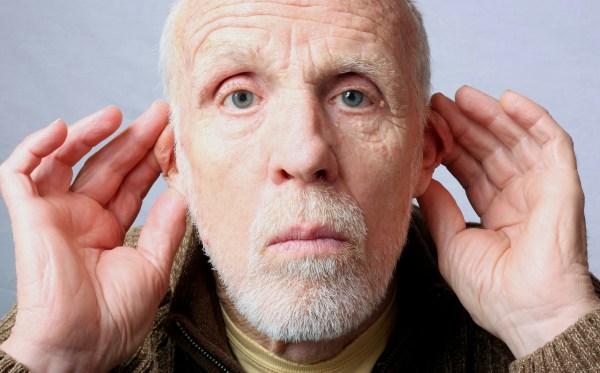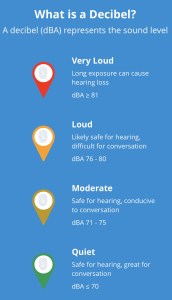We dined recently at an “upscale casual” restaurant in Port Coquitlam. The service and the food were fine, but I was troubled by the noise level. My iPhone decibel meter calculated an average of 86 decibels with a peak level of 95 dB reached often.
An iPhone is not a professional sound measurement device, but it is quite accurate. While the noise level I experienced may do little harm to a diner exposed for only 90 minutes, the risk is quite different for staff members working hours-long shifts.
WorkSafe BC states that regular exposure to noise levels above 85 decibels can cause permanent hearing loss. It says pubs and nightclubs may have dangerous sound levels:
…for much of a typical shift, the noise levels are 10 to 15 decibels above the safe limit of 85 dBA. That’s up to 32 times the safe limit — a level that can start to cause permanent hearing loss in as little as 15 minutes.
The American Center for Disease Control says levels above 80 decibels can be annoying and cause damage after as little as two hours exposure. That is contrary to the position taken by WorkSafe BC, which asserts that 85 dBA is safe for a person working an eight-hour shift. The decibel scale is logarithmic so a 5 or 10-decibel difference is significant.
Noisy hospitality spaces exist by design. Operators have decided that quiet spaces are not good for business. Salon columnist Maggie Hennessey wrote:
…Open kitchens increased overall ambient noise, as did modern décor, which tended toward high, exposed ceilings, bare wood and stone surfaces and a noticeable lack of soft, noise-absorbing accents like curtains, upholstery and carpet. Bar areas have swelled to accommodate more profitable drinking — which likewise comes with more, ahem, boisterous storytelling.
A bustling, noisy restaurant often feels better to some extent — like the space itself is alive...
New York Times food critic Pete Wells admitted he had been ignoring the subject. He mentioned a physician who compared restaurant noise to secondhand smoke. The doctor believes that quieter spaces should be mandated because of the risks of hearing loss.
I suspect some hospitality venues are creating noise that seems natural but is not. Meyer Sound Laboratories of California sells sound modification systems that employ an array of microphones and speakers connected to a digital processing system. Users record a room’s ambient sound, modify it in selected ways and return it immediately to the room. Undesirable sounds can be filtered out while other noises can be amplified.
Patrons bothered by a noisy room can choose to go elsewhere. But, what about staff members who need the jobs?
Servers are often young people who spend little time worrying about how their hearing will function in 20, 30, or 40 years. But that’s one reason this province has an organization like WorkSafe BC.
Is it doing everything possible to ensure safe working environments? If it were, there would be no businesses exposing employees to sound levels that measure 95 or 100 dBA.


Categories: Health





“Stone surfaces” were included in your echo chamber list of offending surfaces. Upon closer inspection it is a rough stone wall behind 8ish seats that permitted the people 8+ apart to hear and understand without shouting. It was surprisingly pleasant in an otherwise noisy place.
LikeLike
I endorse your evaluation of noise in restaurants. There are at least two in town that I chose to use because they are quiet.
LikeLiked by 1 person
The worst are larger chain operations. I suspect most of what they do to create an atmosphere is carefully planned, supported by research, and directed toward gaining positive financial results. Human comfort and long-term health matter less.
Smaller restaurants run by chef-owners are more likely to focus on preparing and serving food because they ignore or cannot afford sophisticated electronic devices that create machine-made environments.
LikeLike
I agree 100%. there is a chain restaurant 2 blocks from my house, food is good but every time my wife and I there we find it way too loud, music in the background that no one is listening to. its just there. So we will stop going there and I told the manager this on more than one occasion
LikeLike